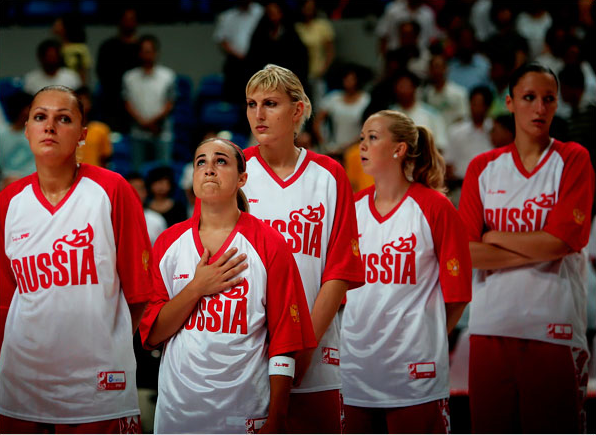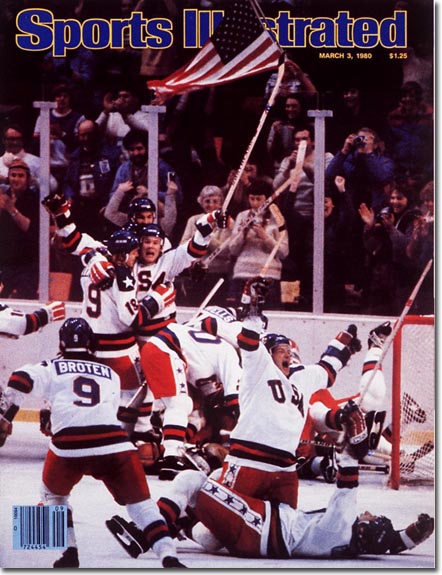What you are looking are members of the Russian Olympic Woman’s basketball team just prior to an exhibition match against the United States in Hainilng, China. The young women in the front with her hand on her chest and her eyes fixed above is Becky Hammon, a former All American at Colorado State University and currently a member of the top-ranked San Antonio Silver Stars of the WNBA. She is also a native of South Dakota and, as of this past year, a naturalized citizen of Russia. There has been something of a small controversy brewing here, as some such as U.S. basketball coach Anne Donovan, have accused her of being unpatriotic, but Hammon’s more numerous defenders have been quick to point out that there is nothing new about naturalized citizens playing in the Olympics, and the simple fact is that she was not originally invited to try out for Team USA and this was her one opportunity to participate in the Olympics. And truth to tell, the look on her face as the Star Spangled Banner plays tells you what uniform she would much rather be wearing, and given the intensity of the gaze—in contrast to the bored and nonchalant indifference of her teammates—I doubt it is simply because it would give her a much better chance of winning a gold medal. This is not a picture of an unpatriotic U.S. citizen regardless of the uniform she is wearing. Indeed, it displays the passionate love of country with a powerful and subtle nuance that reminds us of the tension between nationalism and individualism.
There is more to this picture, however, than the pained and conflicted loyalties of a single, individual athlete, however pronounced that might be. For it also stands as a marker of the changes that have taken place in world of geopolitics over the past 30 years. In the late 1970s the Cold War between the United States and Russia (then the USSR) was at full tilt and the tensions animated by ideological differences between western capitalism and Soviet style communism were no more evident than in the politics of the 1980 Winter and Summer Olympic games held respectively in Lake Placid, NY and Moscow, Russia.
The Winter Games came first, and the picture above stands in stark contrast to the most famous image to come from the Lake Placid games of a ragtag collection of U.S. college hockey players who “miraculously” defeated a Soviet team which, by almost any standard, consisted of seasoned and “professional” veterans.
The present day image comes from before the sporting event not after, and so it is marked by a degree of calm and reserve that we would not expect to find following an upset victory, but the larger point to be made is that the contemporary photograph would never have been taken in 1980 (and if taken surely not featured in the NYT), precisely because it would have been anathema to the spirit of the times—a Cold War world where national citizenship trumped all. We have no doubt not yet moved fully into the “globalized” world that recognizes the legitimacy of post-national citizenship—and, indeed, we clearly continue to live in a country where at least one version of the cold war optic organized around the notion that walls of national separation and isolation might be a good thing persists— but that such a picture as the one of Hammon could even be taken and featured in a mainstream news outlet suggests at least the possibility of such transformation to a more complex and nuanced sense of citizenship on the worldwide stage.
But there is perhaps one additional point to be made as well. For while we have a photograph from Lake Placid that helps to foreground the difference between a Cold War world and a post-Cold War world, there is no contrasting image to be found from the subsequent Summer games later that year in Moscow. The reason, of course, is because the U.S. led a boycott of the Moscow games and no such pictures exist period. And the reason for that boycott: in the summer of 1979 the Soviet Union had invaded …. Afghanistan. There are differences, to be sure, as we are tracking “terrorists” and not seeking to oppress “freedom fighters,” and yet, the more things change …
Photo Credit: Elizabeth Dalziel/AP


It’s true the photo would never have been taken in 1980 but it’s doubtful that this is some kind of marker for the death of nationalism (at least in the U.S.) It’s just deployed in different ways today. Americans still seem to embrace American Exceptionalism.
I think for many, the U.S. won the cold war so who gives a fuck about Russia (or anyone who would choose to play for them)? Most of that American angst/arrogance now seems to be directed against the Middle East/Muslims/Arabs or anyone else who refuses to wear a flag pin.
Dissenting View: I don’t disagree with most of what you say here, and I try to mark that by pointing out the ironies in the picture … the more things change … right? BUT I do think that the very existence of the picture (and the tensions it very clearly underscores between nation and individual) indicates the possibility of a different kind of citizenship, that in itself seems important (but then, admittedly, I believe that real social change is incremental more like the passing of day to night, almost beyond our ability to observe it as it is actually occurring, rather we simply note it once it has occurred). Whether there is uptake here or not isn’t the point, however … possibility is … in the past it wasn’t even “possible” in a certain sense, here, as the picture “shows us” it can at least be imagined in a more or less “real” sense.
Interesting.
I think it’s painfully obvious that regardless of her “hand over her heart” in this picture, playing in the Olympics is more important than her citizenship in the US. Many have gone through great hardships for the PRIVILEGE of becoming a US citizen; she trivializes the importance of her (past) citizenship.
In fact, she stands with her hand over her heart (ala during the Pledge of Allegiance), yet she disavowed her allegiance to US for her own personal gain and has pledged her allegiance to Russia.
In this light I find her behavior in the picture offensive and unpatriotic (considering the circumstances) and if she were to ask for reinstatement as a US citizen after the Olympics, that request should be denied for the remainder of her life.
It’s only sports.
It’s grown-ups playing games.
Why should I care about any of it?